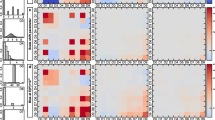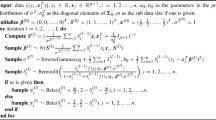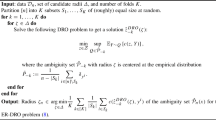Abstract
In multivariate extreme value statistics, the estimation of probabilities of extreme failure sets is an important problem, with practical relevance for applications in several scientific disciplines. Some estimators have been introduced in the literature, though so far the typical bias issues that arise in application of extreme value methods and the non-robustness of such methods with respect to outliers were not addressed. We introduce a bias-corrected and robust estimator for small tail probabilities. The estimator is obtained from a second order model that is fitted to properly transformed bivariate observations by means of the minimum density power divergence technique. The asymptotic properties are derived under some mild regularity conditions and the finite sample performance is evaluated through an extensive simulation study. We illustrate the practical applicability of the method on a dataset from the actuarial context.
Similar content being viewed by others
References
Basu A., Harris I.R., Hjort N.L. and Jones M.C. (1998). Robust and efficient estimation by minimizing a density power divergence. Biometrika, 85, 549–559.
Beirlant J., Dierckx G. and Guillou A. (2011). Bias-reduced estimators for bivariate tail modelling. Insurance Math. Econom., 49, 18–26.
Beirlant J., Joossens E. and Segers J. (2009). Second-order refined peaks-over-threshold modelling for heavy-tailed distributions. J. Statist. Plann. Inference, 139, 2800–2815.
Beirlant J. and Vandewalle B. (2002). Some comments on the estimation of a dependence index in bivariate extreme value in statistics. Statist. Probab. Lett., 60, 265–278.
Charpentier A. and Juri A. (2006). Limiting dependence structures for tail events, with applications to credit derivatives. J. Appl. Probab., 43, 563–586.
Ciuperca G. and Mercadier C. (2010). Semi-parametric estimation for heavy tailed distributions. Extremes, 13, 55–87.
de Haan L. and de Ronde J. (1998). Sea and wind: multivariate extremes at work. Extremes, 1, 7–45.
Dekkers A.L.M., Einmahl J.H.J and de Haan L. (1989). A moment estimator for the index of an extreme-value distribution. Ann. Statist., 17, 1833–1855.
Dierckx G., Goegebeur Y. and Guillou A. (2013). An asymptotically unbiased minimum density power divergence estimator for the Pareto-tail index. J. Multivariate Anal., 121, 70–86.
Dierckx G., Goegebeur Y. and Guillou A. (2014). Local robust and asymptotically unbiased estimation of conditional Pareto-type tails. Test, 23, 330–355.
Draisma G., Drees H., Ferreira A. and de Haan L. (2004). Bivariate tail estimation: dependence in asymptotic independence. Bernoulli, 10, 251–280.
Drees H. (1998a). On smooth statistical tail functionals. Scand. J. Stat., 25, 187–210.
Drees H. (1998b). A general class of estimators of the extreme value index. J. Statist. Plann. Inference, 66, 95–112.
Dutang C., Goegebeur Y. and Guillou A. (2014). Robust and bias-corrected estimation of the coefficient of tail dependence. Insurance Math. Econom., 57, 46–57.
Feuerverger A. and Hall P. (1999). Estimating a tail exponent by modelling departure from a Pareto distribution. Ann. Statist., 27, 760–781.
Fraga Alves M.I., Gomes M.I and de Haan L. (2003). A new class of semi-parametric estimators of the second order parameter. Port. Math., 60, 193–213.
Goegebeur Y., Beirlant J and de Wet T. (2010). Kernel estimators for the second order parameter in extreme value statistics. J. Statist. Plann. Inference, 140, 2632–2652.
Goegebeur Y. and Guillou A. (2013). Asymptotically unbiased estimation of the coefficient of tail dependence. Scand. J. Stat., 40, 174–189.
Gomes M.I. and Martins M.J. (2004). Bias reduction and explicit semi-parametric estimation of the tail index. J. Statist. Plann. Inference, 124, 361–378.
Hill B.M. (1975). A simple general approach to inference about the tail of a distribution. Ann. Statist., 3, 1163–1174.
Kim M. and Lee S. (2008). Estimation of a tail index based on minimum density power divergence. J. Multivariate Anal., 99, 2453–2471.
Ledford A.W. and Tawn J.A. (1997). Modelling dependence within joint tail regions. J. R. Stat. Soc. Ser. B, 59, 475–499.
Peng L. (1999). Estimation of the coefficient of tail dependence in bivariate extremes. Statist. Probab. Lett., 43, 399–409.
Pickands J. (1975). Statistical inference using extreme order statistics. Ann. Statist., 3, 119–131.
Ramos A. and Ledford A.W. (2009). A new class of models for bivariate joint tails. J. R. Stat. Soc. Ser. B, 71, 219–241.
Weissman I. (1978). Estimation of parameters and larger quantiles based on the k largest observations. J. Amer. Statist. Assoc., 73, 812–815.
Author information
Authors and Affiliations
Corresponding author
Rights and permissions
About this article
Cite this article
Dutang, C., Goegebeur, Y. & Guillou, A. Robust and Bias-Corrected Estimation of the Probability of Extreme Failure Sets. Sankhya A 78, 52–86 (2016). https://doi.org/10.1007/s13171-015-0078-3
Received:
Published:
Issue Date:
DOI: https://doi.org/10.1007/s13171-015-0078-3




